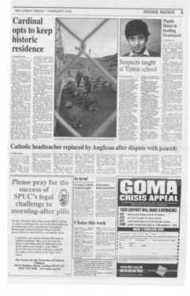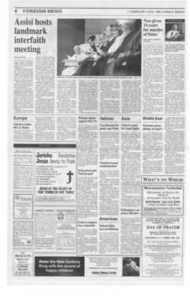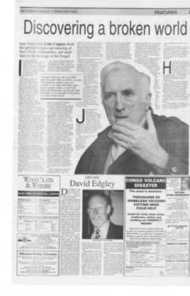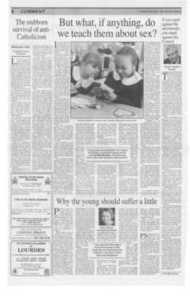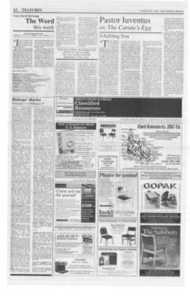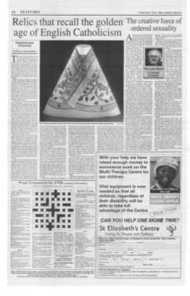Page 10, 1st February 2002
Page 10

Report an error
Noticed an error on this page?If you've noticed an error in this article please click here to report it.
Tags
Share
Related articles
A Preachy Rant Against The Church
The Stuff Of Nightmares
Kidman Denies Pullman Film Is Anti-catholic
Pullman: New Assault On The Church
Professor Offers A Riposte To Philip Pullman
Closing children's minds
Books
Sarah ,I,;yhnson
won
Lik _ e Alice, Philip Pullman, who has r the Whitbread Book of the Year award with The Amber Spyglass. gives very good advice. "The more a writer has a purpose or didactic reason, the more he/she dampens the musical tones and harmonies of his work," he told (I quote a paraphrase) the Royal Society of Literature last year. When it comes to The Message, the author should, he said, 'just shut up".
Unfortunately, like Alice, Pullman does not always take his own advice. His Dark Materials. the epic fantasy of which The Amber Spyglass is the concluding third part, has a clear "didactic reason": to put children and teenagers off all organised religion, especially Christianity, and in particular the Catholic Church; and to do so by propaganda and suggestion.
If you haven't read the books, you need to know that the major baddy is a vast organisation called, in its parallel universe, both the "Magisterium" and "the Church". Headed by a Pope who is protected by brutal Swiss Guards, every aspect of it is a caricature of the Roman Catholic Church, thrown together with the total disregard for even-handedness which marks a brilliant polemicist.
The Magisterium tortures heretics; its celibate priests are sadistic or ridiculously stupid, and it is engaged in a diabolical conspiracy against
7:11;xind. But though Magisterium nuns are seen comically crossing themselves, Pullman never eugages with the meaning of the gesture: he keeps the Cross well out of his story. In over 1200 pages Jesus is mentioned only once.
Having only been a Catholic for 10 years, I have not quite yet got used to being in a persecuted minority. "A lot of kids might think the real Catholic Church is actually like the Magisterium," I hazarded to my sensible non-Catholic friends, after reviewing the second book, reservedly, in The Times.
Don't be silly, said the sensible non-Catholic friends. The Magisterium is in a parallel universe. It is not meant to be the real Church. Oh, that's OK then. A fine writer like Pullman would not try such a cheap trick as to muddle up the "alternative reality" Church with the Church I love.
Then out came the third book and towards the end of it a scientist and ex-nun from our Church, our world — not the parallel one — describes her loss of faith: she became an atheist because she met a man she fancied.
"The Christian religion is a very powerful and convincing mistake," she declares, deriving the non-existence of God from her own unsuitability for a celibate life with astonishing non-logic. By now, the reader's head is packed with 1000 pages of dreadful atrocities by the "Magisterium"; and Pullman neatly places the real-world Church into the frame he has built for its other-world caricature.
The words "Author's Message" do not merely leap from the text. They bound from it like an illtamed labrador, knocking delicate plot-lines off tables and churning Pullman's usually vivid prose into a preachy rant. Why does he the Catholic Church with an intensity that makes the Rev Ian Paisley look like Cardinal Newman? Pullman's knowledge of the modern Church, its work, its institutions, its people. appears scanty. His account of Mary's loss of faith is laughable. His experience of Christianity, it would seem, amounts to having read CS Lewis's Narnia books for the first time in adulthood.
Most uncomfortable for me has been the unfettered joy with which my media colleagues have eulogised a book which attacks a religious minority — my own.
"He writes like an angel," they coo. Yes, Pullman's glittering imaginative constructs certainly provoke reflection on the nature of the cosmos, of consciousness, of science.
But behind the adoration, I sense the steely strength of English anti-Catholic feeling: so polite, so cold, so insidious, so understated — you don't know it's there until it hits you, like a slap from a dowager's bony hand.
What if Pullman had replaced the Magisterium's crosses and churches with crescents and mosques? Not that he would have dared. Like any playground bully, Pullman knows which kids are least likely to kick him back.
One writer did stand up to him: as early as 1999, Leonie Caldecott joked in this newspaper that those who wanted to ban JK Rowling's books could find others far more "worthy of the bonfire": for example Pullman's.
She in no way advocated either banning or burning the books herself. Yet ever since, she has been gleefully misquoted and excoriated by Pullman, his publicists and his vast army of fans.
Pullman told one interviewer that Jesus, Mohammed and Buddha were "geniuses", but he could not bear the "lesser people", the "priests and mullahs and vicars ... [who] trundle in to mediate their ideas for the benefit of the people who they imagine are lesser than themselves...to organise churches and temples so they could control and punish".
It seems he doesn't mind us knowing about religion — but if we "lesser people" have the impertinence to try living according to Jesus' word — then we are well out of order.
How he expects Christ's followers to follow His word without getting organised, Pullman has never said. Why are old hospitals always named Saint Somebody's? We are supposed to help the poor, sick and homeless, not sit thinking nice thoughts about helping them.
Warts and all, the churches are the channels by which ideals of which Pullman surely approves the ideals of social justice, our responsibility for the world, the equal value of each person (not Pullman's categorising of people as "lesser" or "greater") — have been handed round the globe for argument arid development — even through the darkest days of Christian history.
A book can open a child's mind, or it can close it. It can open doors or, with tales of bogeymen, it can frighten the child away from an area of human experience — if the author chooses. It is sad that the one book which paved the way for better recognition of children's literature, by beating "adult" books to a major prize, had to be a book that seeks to close children's minds, while pretending to open them.
Sarah Johnson is the Children's Books Reviewer of The Times.
blog comments powered by Disqus




